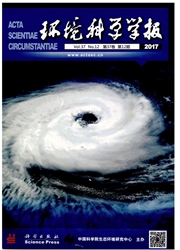

 中文摘要:
中文摘要:
随着中国的快速城市化和服务业的发展,旅游业逐渐成为主要的温室气体排放者之一,酒店面临节能减排的压力并缺乏相关的评价标准.本文建立了生命周期的酒店业碳排放核算框架和低碳指标,并以宁波市为案例城市,对其3种类型的酒店进行碳排放核算和低碳指标的分析.结果表明,能源消费是酒店业最大的碳排放源,占93.5%-94.1%;各类酒店的碳排放量在2013—2015年间有约8.2%-9.2%的减少;从低碳指标看,五星级酒店的单位建筑面积的碳排放最小,单位出租间天数和单位旅客的碳排放最大,而四星级酒店的单位营业额碳排放最小.优化区域电力碳排放水平和酒店的软硬件设施是减少酒店碳排放的有效措施,碳标签是有效的酒店业低碳管理的政策工具.
 英文摘要:
英文摘要:
With rapid urbanization and development of tertiary industry in China,tourism is becoming one of the major emitters of greenhouse gases. Under the background of energy saving/carbon mitigation and insufficiency of related assessment standard of hotel industry,a life-cycle assessment framework was developed to analyze carbon emissions and low carbon indicators of 3 types of hotel in Ningbo city,China. The results showed that energy consumption was the largest carbon emitter,accounting for 93.5% - 94.1%. The total emissions of all 3 types of hotel declined by 8.2% -9.2% from 2013 to 2015. Five-star hotel had the smallest emission per square meter among all types of hotel but the largest emission per room,per day and per guest. Four-star hotel had the smallest emission per 10 thousand yuan turnover,showing its high efficiency. Optimizations of regional power carbon emission level and hotel facilities are effective measures to reduce carbon emissions intensity,while carbon label is a useful policy tool for carbon mitigation in hotel management. This study provides useful methodology for hotel carbon accounting,low carbon assessment,and low carbon hospitality management.
 同期刊论文项目
同期刊论文项目
 同项目期刊论文
同项目期刊论文
 期刊信息
期刊信息
